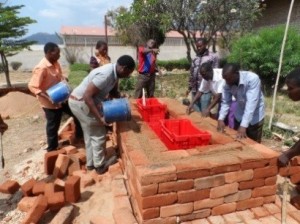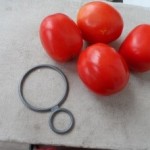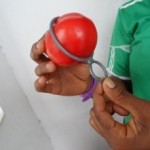Postharvest technology dissemination activities in northern Tanzania
By Odette Ngulu, Ministry of Agriculture, Food and Cooperatives, Tanzania

Building a Zero Energy Cool Chamber (ZECC).
This post is part of the ADM Institute’s #PreventPHL blog campaign, following up on the First International Congress on Postharvest Loss Prevention. To read more posts in the series, click here.
The Northern Zone Agricultural Research for Development Institute (NZARDI) in Arusha, is a non-profit public institution under the Ministry of Agriculture, Food security and Cooperatives. NZARDI operates from Selian Agricultural Research Institute (SARI) based in Arusha. Its mandate is to conduct demand driven Agricultural research in northern Tanzania; primarily focused on resolving challenges along the value chain of major food crops grown in Kilimanjaro, Arusha and Manyara regions and Lushoto district in Tanga region. In partnership with various international research centers, the institute has generated a number of cost-effective technologies for increasing productivity, enhanced household income, food security, nutrition, food safety standards and decreased postharvest losses.
In Northern Tanzania, fruits and vegetables production is dominated by smallholder farmers. Productivity is to a large extent influenced by rainfall pattern. Most farmers and handlers are not conversant with appropriate scale postharvest handling practices therefore contribute to postharvest losses by using common practices or by not using practices known to reduce losses and help maintaining produce quality, safety and marketability. Estimated losses ranging between 40-80% are common on the farm, during postharvest handling, food processing, storage, and distribution. This translates into low returns to investment and disincentive to growers. This scenario underscores the essence of training handlers on appropriate low-cost, small-scale postharvest technologies to mitigate losses associated with perishability of fresh produce.
In 2013 a Postharvest Training and Services Centre (PHTSC) was established at the Agricultural Technology Transfer Centre (ATTC) based in Arusha under SARI management, with support from USAID HortCRSP and Postharvest Education Foundation (PEF) Projects. The main objective being “to promote wide adoption of improved postharvest handling practices of locally grown fruits and vegetables for enhanced produce quality, food safety, nutrition and income earnings through practical training.”
Centre activities
- Developing training material.
- Training of extensionists and different categories of handlers of fresh produce especially fruits and vegetables on appropriate scale postharvest technologies.
- Selling of pre- and postharvest handling supplies to clients at a reasonably low price.
- Exposure of postharvest technologies to a wider audience during annual agricultural show.
- Training of small-scale farmer and processor groups on postharvest handling and value addition to cereals, legumes, roots and tuber crops.
- Advisory services.
Training Topics
In collaboration with the Marketing Infrastructure, Value Addition and Rural Finance Support Programme (MIVARF) consultants, and the Postharvest Education Foundation (PEF), SARI conducts training on postharvest technologies. Flow of training topics is organized basing on the interacting steps involved in any postharvest system since produce is handled by many different handlers from harvesting to consumers.
Main topics include:
- Introduction to postharvest systems
- Maturity indices, harvesting and quality aspect
- Sorting, grading, packaging and transportation


Standardized measuring tools for tomatos.
- Cool storage; evaporative cooling by use of zero-energy cool chamber (ZECC)
- Principles of food processing, food hygiene and safety
- Processing, preservation and storage
- Entrepreneurship skills
- Registration and licensing
For more information, contact mivarf@mivarf.go.tz
The blog entries in this #PreventPHL series are written by members of the PHL Prevention community of practice. The opinions expressed are those of the individual authors, and do not necessarily reflect the position of the ADM Institute. In addition, none of the statements should be considered an endorsement of any person, product, or technique by the ADM Institute.



1 Comment
I am always delighted to see topics about postharvest. Glad to have Lisa, Diane, Lizanne . and all the teams who keep on coming to Tanzania for backstopping.
Tanzania is blessed to have many postharvest specialists under PEF programme, hope we manage to disseminate the technologies and recruit more specialists.
Let us share research results globally, we need them for loss reduction of our crops
Add Comment